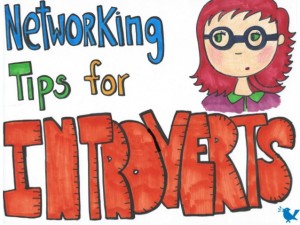Many of us dread the idea of networking, though we all know how important it is. If you see yourself more as an introvert, you may feel very uncomfortable at social events, or you may be reluctant to reach out to people for advice. As such, you may miss opportunities to connect with people and that may affect your professional development. Yet, the good news is there are often two sides to each personality. For example, if you are an introvert, you may be a hesitant speaker, but you often might be a good listener and you might be sensitive to other people’s feelings. If you are an extrovert, you may feel more comfortable talking to people, but sometimes you may need to be a better listener so you don’t miss out information. So if you take advantage of the strengths of your personality and make a goal to work on the weaknesses, you are more likely to branch out and have more enjoyable and satisfying networking experiences. Here are some tips:
- First, understand your fear. Ask yourself: What am I worried about? Am I afraid that people will not respond to my email? Am I nervous because I often don’t know what to talk about? Do I fear that people will not be interested in speaking to inexperienced students like me? Well, these are natural worries that we all might have. But there are ways to think about them from different perspectives, and there are ways to better prepare us for networking opportunities.
- Realize that sometimes networking can be a numbers game. So take no offense if you don’t hear back when you reach out to people. There can be all sorts of legitimate reasons why people don’t respond to your email. They may be going through a difficult time in their lives; they may be too busy at that moment; they may not have seen your email because they are no longer using the email listed on QuakerNet or wherever you found it. So if you don’t hear back from this person, don’t be discouraged. Just simply move on to the next person.
- Think of social events as an opportunity to meet new people and learn about new perspectives, rather than to impress others. If you go to a social event hoping to impress people or to get business cards, you will surely have more pressure because you make it all about yourself. However if you decide just to meet interesting people and enjoy a good conversation, you may be more relaxed and comfortable.
- Prepare some talking points and ask good questions. If you are meeting with someone for the first time, it’s only natural that he or she would want to know something about you. So be ready to talk about your studies, activities, career goals, personal interests, or just anything you feel comfortable talking about. Asking questions is also a good way to get the conversation going. Chances are the fact that you are an introvert may make you a good listener, and that would prompt you to ask good questions. Asking questions is also an effective way to show your interest in the other person, and people generally respond well to those who are interested in them.
- Always try to see the personal side of the person that you meet with. When you talk to people, especially those in a higher status, remind yourself that no matter what title that they are wearing, they are always someone’s child, or someone’s husband/wife or dad/mom. If you can see the personal side of that person, it may help you overcome the anxiety that may be caused by the title that person is bearing.
- Be humble but confident. Yes, you may be a green college student, and you may not have years of professional experience. But who wasn’t once young and green? Remind yourself that, a few years from now, you might be the advice giver.






